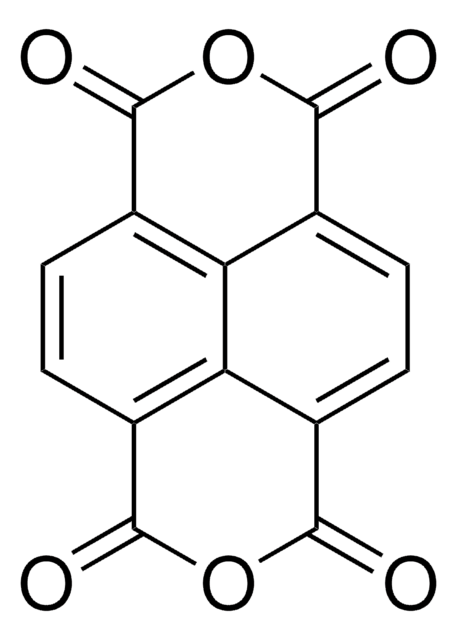932760
3,4,9,10-Perylenetetracarboxylic dianhydride
Sinónimos:
PTCDA, Perylenetetracarboxylic acid dianhydride, Perylene-3,4,9,10-tetracarboxylic dianhydride, Pigment Red 224
About This Item
Productos recomendados
assay
99% (sublimed)
Quality Level
mp
>300 °C
solubility
DMSO: slightly soluble
orbital energy
HOMO 5.85 eV
LUMO 3.9 eV
InChI
1S/C24H8O6/c25-21-13-5-1-9-10-2-6-15-20-16(24(28)30-23(15)27)8-4-12(18(10)20)11-3-7-14(22(26)29-21)19(13)17(9)11/h1-8H
InChI key
CLYVDMAATCIVBF-UHFFFAOYSA-N
¿Está buscando productos similares? Visita Guía de comparación de productos
Application
The compound has attracted much interest as an organic semiconductor. It has potential applications in organic and molecular electronics, and typically used as an archetype molecular compound. PTCDA shares many properties with conventional semiconductors (with their delocalized electronic states), and insulator-like organic molecular crystals (OMCs) (with their large absorption oscillator strengths, excitonic self-trapping, polaron-assisted conduction, etc.). That is due to extremely close π-π stacking, an unusually small intermolecular distance of only 3.21 A. Among its applications, it is important to highlight the latest focus on environment monitoring, self-assembly and photocatalysis.
Storage Class
11 - Combustible Solids
wgk_germany
WGK 1
Certificados de análisis (COA)
Busque Certificados de análisis (COA) introduciendo el número de lote del producto. Los números de lote se encuentran en la etiqueta del producto después de las palabras «Lot» o «Batch»
¿Ya tiene este producto?
Encuentre la documentación para los productos que ha comprado recientemente en la Biblioteca de documentos.
Nuestro equipo de científicos tiene experiencia en todas las áreas de investigación: Ciencias de la vida, Ciencia de los materiales, Síntesis química, Cromatografía, Analítica y muchas otras.
Póngase en contacto con el Servicio técnico






![9,9-Bis[4-[(4-ethenylphenyl)methoxy]phenyl]-N2,N7-di-1-naphthalenyl-N2,N7-diphenyl-9H-Fluorene-2,7-diamine ≥98% (HPLC)](/deepweb/assets/sigmaaldrich/product/structures/217/694/0386f9cf-a92c-48f3-bde7-f7a23d7cdc3a/640/0386f9cf-a92c-48f3-bde7-f7a23d7cdc3a.png)